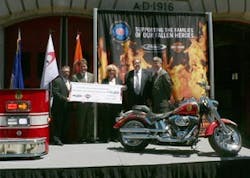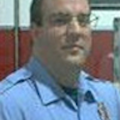Editor's Note: This year's Full Throttle Support campaign will kick-off at Fire Rescue International on Friday, Aug. 28.
The general public may not know much about the fire service like what trucks are what, why we carry different size hoses, or how many firefighters it takes to make a safe and effective attack on a structure fire. But everyone knows the tragedy that is a line-of-duty-death (LODD) -- someone who has died while trying to help others.
Those of us in the fire service know more than that. We know who it was that is now gone. Maybe we never met the brother or sister that was taken from this world, maybe the LODD announcement was the first time we ever saw their name. But we still knew them.
Just read the announcement and you'll see their blood family and department family quoted over and over about them being a family person, a dedicated firefighter, the joker that was always there to put a smile on, the one that was always first in line when someone else needed help. Every one of us can put a name from our own departments to those descriptions. Maybe some of you feel like I do as I read the announcement and say a little prayer for those left behind and think "but for the Grace of God, go I."
I never win raffles, contests, or obviously the lottery so contrary to popular belief I didn't enter a contest for a motorcycle. I simply made a donation to the National Fallen Firefighter Foundation's (NFFF) Scholarship Fund raffle for the 2009 Pierce-Harley Davidson Fat Boy. Like everyone else I have talked to that bought tickets, we all just made donations because it is the right thing to do to support those left behind when a brother or sister falls in the line. I was just glad to do a small part and contribute like Pierce and Harley Davidson did in a large part by helping NFFF to make the fundraiser a reality. At this time of economic recession I was proud to see two American companies giving back no matter how bad CNN says it is.
Needless to say I was completely unprepared for the phone call that came on May 6 asking me to be an Ambassador for NFFF. I thought it had something to do with the chapter I wrote for the soon to be released textbook -- its profits will go to the NFFF -- or even something related to our grant work or articles for Firehouse.com. To be honest I had forgotten I had even made the donation and that it was attached to a raffle, so I was unprepared for the next part of the conversation where they told me the Ambassadorship came with a new two-wheeled vehicle.
But I was also completely unprepared for the rush of emotion when we got to the ceremony on May 21 at Washington D.C. Fire-EMS Station 3. The Assistance to Firefighter Grants (AFG) application period ended at 5 p.m. EST the day before, so for three weeks prior I was only sleeping about three hours a day on average, and probably half that the last week since we had so many applications to finish writing. So I was feeling something for sure right then, but I first thought maybe I'm just feeling tired, maybe I'm just excited because I've always wanted a Fat Boy and now I'd have one.
But that wasn't it. The true reason I was there finally hit me: I was there because some no longer were. I was there because the families of our brothers and sisters lost in the line needed help taking care of their children and giving them the chance to go to college when they thought the cost was out of their reach. I was there with my three-year-old daughter and my wife, who is due in early November with our second child, while some around me were there without their husband, brother, father, mother, sister, son, or daughter because they gave their lives in the service of others. There were chiefs, company officers, and fellow firefighters missing their brothers and sisters in service and I got to stand there with my loved ones. I was unprepared for the guilt I felt for feeling happy.
I wasn't prepared to hear Tina Hauk talk about how badly she missed her husband Brian, who died in the line two days before Christmas in 1997 at the age of 32, leaving two small children behind. I wasn't prepared to hear her say how she saw the bike at FDIC and the word "Remember" in the NFFF logo on the rear fender made her do exactly that, and break down.
I wasn't prepared to meet Laurie Tilton, daughter of Katy, TX, Fire Department Chief Gary Tilton, a mutual aid department to my own, a man who I only had the privilege of meeting just a handful of times. Chief Tilton died of a heart attack in October of 2004 after returning from a call at the young age of 58.
I also wasn't prepared for the reality that hit me as I stood there and realized I could be next. One of these contests could end up having to help provide for my children's education if I didn't make a change. As a guy that graduated high school at 165 pounds on a six-foot frame because I couldn't eat enough to gain weight from being either at the hockey rink or in the gym, I never thought much about how much I weighed. I managed to pack on a few pounds before walk-on hockey tryouts freshman year thanks to an extremely high calorie diet, but even when I "finally" got up to 215 pounds at the age of 22, I only had a BMI of 4 percent body fat and a 30-inch waist. I was active, lean, and didn't have a care in the world related to physical fitness.
Every now and again over the past 10 years I'd think maybe I ought to lose a few pounds, maybe I should hit the gym more, but never did anything serious about it. I didn't truly think anything of my weight until I stood there on May 21, 2009 at the age of 35 years old weighing in at 258 pounds with a BMI over 30. Hindsight never misses so I can sit here and say I should have known better. After all, both of my grandfathers had terrible cardiac histories. Both were volunteer firefighters until their health got so poor they couldn't continue. One I never knew as he passed before I was born, and the other I knew for less than 16 years. He had his first heart attack at age 40 and managed to make it into his 70s but with surgeries galore helping to make it that long.
So there I stood with my loved ones realizing that I put them in a terrible position of my own doing. I could be the next statistic. I wasn't prepared for that reality though it should have been with me all along. What other outcome can one expect from being overweight and having a poor diet and then participating in the most physically demanding job in the world? I about kicked myself right in front of everyone for putting myself and my family in that position.
I also realized it didn't matter what anyone else does. After all, I teach everyone I interact with on grants that if we want to improve our departments we have to start with ourselves and what we need, not what other departments need in terms of gear, trucks, etc. The same goes for us personally. If we want to improve our departments and reduce risks each one of us has to take the steps necessary to make that happen. Training is part of it, and for many of us we have to put the egos aside and realize that we're not the spring chickens we used to be and we can't eat everything that isn't nailed down. We have to exercise, we have to eat right or we'll never get away from cardiac related issues causing 50 percent of the LODDs every year.
So my decision for my future was made that day: I would truly do what Ron Siarnicki asked me to do in that phone call and be an ambassador for NFFF by learning from my past mistakes and living to honor and remember those that have fallen. And it starts with me and what I need to do for myself, my family, and my department, and that is to reduce the risk that I'm the one that goes down next and puts others in danger for not taking care of myself. So far it's working. Since that day I've managed to lose 15 pounds and rearrange some of the remaining 243 pounds into better weight by eating the right foods and hitting the gym at least three days a week. And I'm not stopping until I'm truly in shape and not going back to the way I was ever again. Whether you like it or not you're going to hear about me thinning out and getting into shape so you can realize that if you're overweight and out of shape like me that you're not alone, and you can do it one day at a time.
I'm going to start the Funding and Grants Blog at Firehouse.com here shortly and I'm going to put in the occasional update on my progress in there so everyone can hold me accountable also. Hopefully I'm changing early enough in life so you don't have to read my name anytime soon in a blast e-mail. I encourage everyone to do the same. Take a look at your families and brothers and sisters around the station if you want your own motivation. They need us to be in the best shape possible to have the best chance at coming home at the end of every call.
That's the somber part of my message, but luckily for all of you the happier part of my role is to create awareness of the next contest, which will open up at the end of August during Fire-Rescue International in Dallas. I was surprised to learn that only 3,700 people were responsible for the 12,000 entries that were received, and I think we as the fire service can do better than that. The families of our brothers and sisters that are no longer with us need our support. I know times are tough, and I know budgets are tight at the station and at home. But if you get to go home to your family at the end of the run or shift, remember those that will never see their loved one walk through their front door. Remember that every little bit helps.
We already do an extraordinary job, with one million of us protecting the other 308 million U.S. residents. Let's take it one step further and increase the $135,000 that was raised this time for to fund the scholarship and other programs. I'm donating again. After all, it's never been about the motorcycle.
Related Links
BRIAN P. VICKERS, a Firehouse.com Contributing Editor, has been in the fire service for 16 years and is currently with the Westlake Volunteer Fire Department in Houston. He is CEO of Vickers Consulting Services (VCS), one of the country's leading public safety consulting firms specializing in strategic financial planning and grants. To date VSC has helped their clients receive nearly $120 million in grant awards. To read Brian's complete biography and view his archived articles, click here. Brian has hosted a variety of podcasts that look at the Assistance to Firefighter Grants program. You can reach Brian by e-mail at [email protected].

